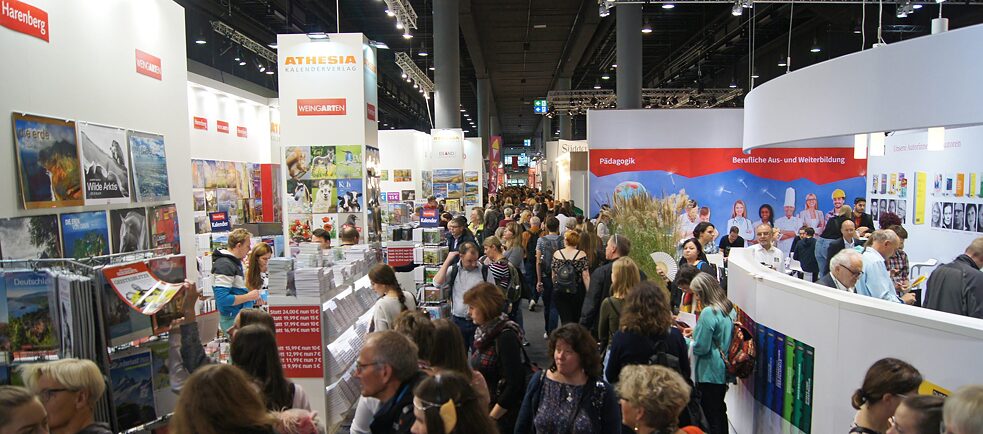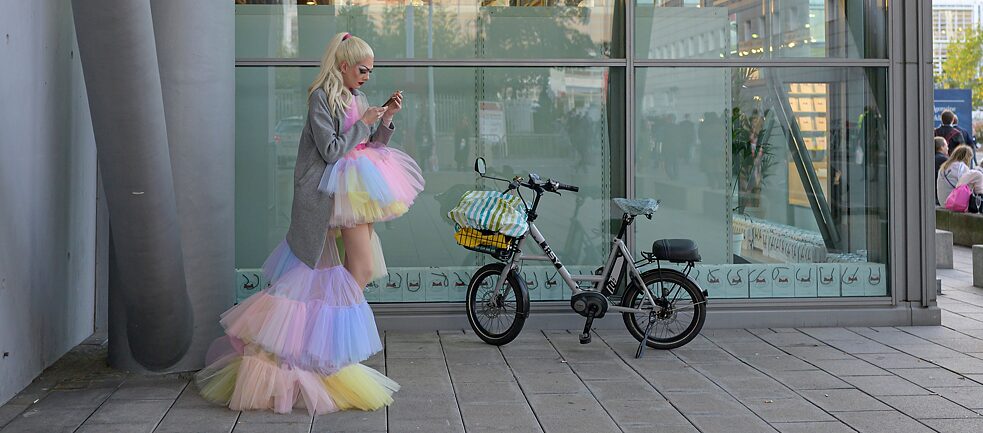Frankfurt Book Fair
Read and work

As the saying goes: Sometimes you don’t know what you’ve got ‘til it’s gone. As the Frankfurt Book Fair kicks off, Christoph Schröder takes a somewhat wistful look back at the good old book fair days – and though he’s looking forward to this year’s fair, his hopes are pinned on the next.
It might be a truism, but the outbreak of the coronavirus pandemic in March 2020 has shown how true it truly is: The Frankfurt Book Fair thrives on personal encounters. Literature is an ongoing conversation that never ends, and reading a book is not an end but a beginning. This really hit those in the book business over the course of the past year when they felt the loss: no chance encounters in the crowded exhibition halls, no “I don’t really have the time, but let’s sit down and chat for a moment”. In 2020, all that was possible was a joyless digital book fair with an accompanying program of events in the city. It was more than we could have hoped for, and it went well, in part because the audience just grateful it was happening at all.
 Back when more than just the trade fair world was still in order: the Frankfurt Book Fair has above all always been a place of personal encounter.
| Photo (detail): © picture alliance/Wolfgang Minich
Back when more than just the trade fair world was still in order: the Frankfurt Book Fair has above all always been a place of personal encounter.
| Photo (detail): © picture alliance/Wolfgang Minich
Smalls steps towards normalcy
Now we are one year and many jabs further along. So what can we expect from the 2021 Frankfurt Book Fair? What is allowed and what isn’t? One of the first highlights and simultaneously one of the first stumbling blocks will be the German Book Prize award ceremony at Frankfurt’s Römer on Monday, 18th of october. It is a highlight because a lot of colleagues and publishing house employees worth meeting will be there. And it is a highlight because, despite all the criticism surrounding the prize, there is always suspense about who will get the coveted award. This year, the German Book Prize will again be presented in front of a live audience, however small. A first step back towards normality of a sort, though no one has a clear idea of just what that might look like.
This is equally true of events at the exhibition centre. According to the Book Fair’s official figures, more than 1,500 exhibitors have registered. But who will actually be at the booths? Will it be possible to create something akin to a working atmosphere in the extra-wide pathways, to engage in exchange at the exhibition booths? Guest of Honour Canada will make up for the 2020 cancellation. The guest of honour country’s pavilion on the exhibition grounds has always been a small island of peace amid the hectic hustle and bustle of the trade show. The darkened rooms created by 2011 Guest of Honour Iceland have never been forgotten: there were bright nooks for reading and working with high room dividers creating both space and intimacy against a backdrop of the quiet shushing of the sea. It would be quite an achievement if the Canadians succeed in creating a similar atmosphere.
No spontaneous exploration, no parties
It is safe to say that the highlights of the Frankfurt Book Fair will be the events for the public. On the fairgrounds themselves, the venerable Festhalle will be the broadcasting centre for more than 60 hours of events. In the city, the Book Fair will hold the Bookfest at various locations. This series should not be confused with one of the most glorious trade fair innovations in recent years: since 2009, Frankfurt’s Cultural Office has granted publishers spaces in city centre for showcasing their authors. In 2021, more than 100 readings are planned in the nonfiction and fiction categories, and almost all with free admission. In past years, this meant an opportunity to stroll through the rooms of the Frankfurter Kunstverein and the surrounding venues, casually discovering new authors, listening in on conversations, and gathering impressions. The pandemic won’t allow this kind of freedom though: Tickets have to be booked in advance, but they are still free.
 Just as integral to the book fair – where the visitors are as colourful and diverse as the fair itself.
| Photo (detail): © picture alliance/SvenSimon/Anke Waelischmiller
One thing that will definitely be missing is parties. This means there will also be no minor scandals, no hot gossip, no rumours, no secrets. Instead, there will be contact tracing. The coronavirus has pared down the business of literature and the book fair, reduced it to its core elements: read and work. That has to change. Hopefully by next year.
Just as integral to the book fair – where the visitors are as colourful and diverse as the fair itself.
| Photo (detail): © picture alliance/SvenSimon/Anke Waelischmiller
One thing that will definitely be missing is parties. This means there will also be no minor scandals, no hot gossip, no rumours, no secrets. Instead, there will be contact tracing. The coronavirus has pared down the business of literature and the book fair, reduced it to its core elements: read and work. That has to change. Hopefully by next year.